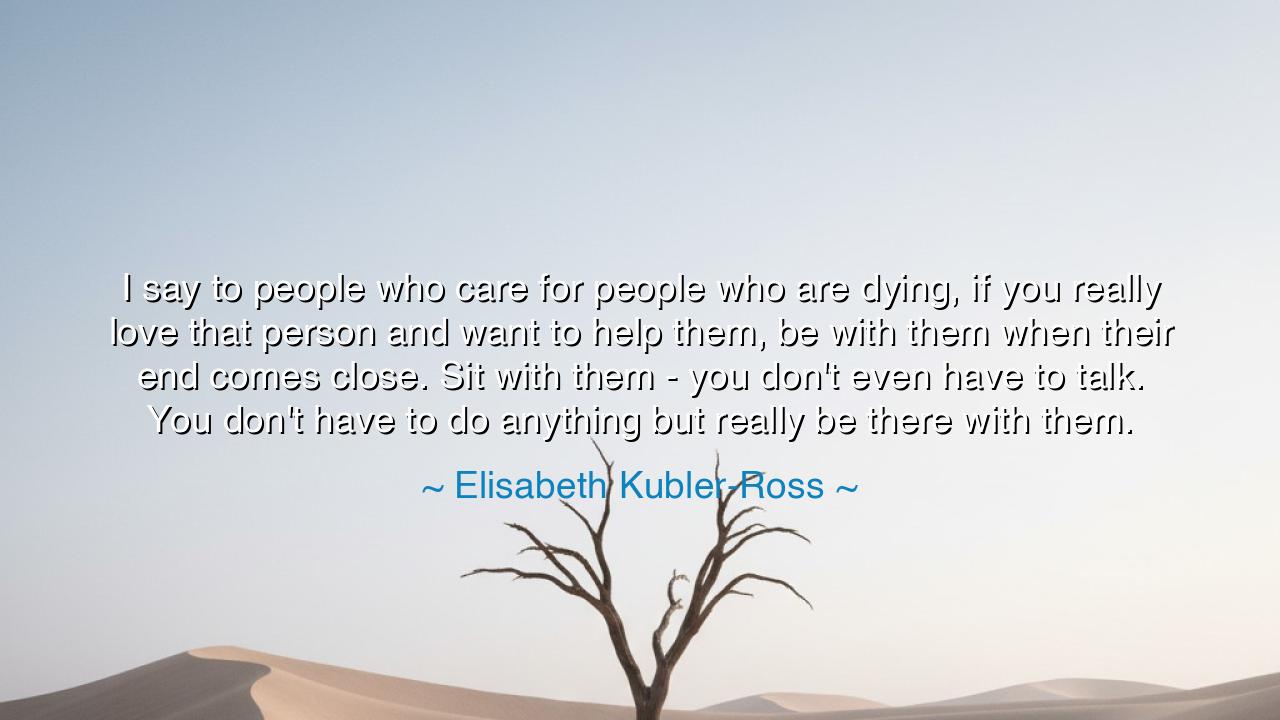
I say to people who care for people who are dying, if you really
I say to people who care for people who are dying, if you really love that person and want to help them, be with them when their end comes close. Sit with them - you don't even have to talk. You don't have to do anything but really be there with them.






"I say to people who care for people who are dying, if you really love that person and want to help them, be with them when their end comes close. Sit with them - you don't even have to talk. You don't have to do anything but really be there with them." These wise words by Elisabeth Kubler-Ross hold a depth of truth that speaks to the heart of human connection in the final moments of life. In a world that often seeks to fix, comfort, and distract, Kubler-Ross emphasizes the power of simply being present, of offering the gift of presence without the need for words or grand gestures. To be there, in stillness and compassion, is one of the greatest acts of love we can offer to another in their final moments.
In the ancient traditions, the journey of death was seen not as a moment of fear or despair, but as a passage—often shared in the presence of loved ones, where the final moments could be faced with dignity and peace. In Greek philosophy, the stoics taught that the art of living well was deeply intertwined with the art of dying well. Epictetus and other stoic philosophers spoke of death not as something to be feared but as the natural conclusion to a well-lived life. In their teachings, the presence of a friend or loved one was essential to facing this final passage, for it was through their companionship that the one who was dying could experience comfort and reassurance. The act of sitting together, of being truly present, was an act of profound love—a love that transcended words.
The teachings of Buddhism also emphasize the importance of presence in the face of death. The Buddha, in his wisdom, often spoke of the impermanence of life and encouraged his followers to face the end with equanimity. To truly assist someone in their transition, however, was not through grandiose efforts or solutions but through offering a calm and compassionate presence. Compassion—the foundation of Buddhist practice—involves being with others in their suffering, not by fixing or rescuing them, but by sharing their burden through quiet solidarity. This practice of being with the dying echoes Kubler-Ross’ sentiment that sometimes, the greatest thing one can do for another is simply to be there.
Consider the story of Socrates, the great philosopher, who in his final moments, sat surrounded by his friends and disciples. As he faced the death sentence imposed upon him, Socrates remained calm, unflinching in his approach to the inevitable. His friends, though filled with sorrow, sat with him in silence, offering their presence rather than words. In this moment, Socrates was not in need of speeches or advice; he needed only their companionship, their witnessing, and their mutual acceptance of the moment. Socrates’ death became a profound teaching in itself, for it showed that even in suffering, one can find peace through the love and presence of others.
In more recent times, the great spiritual teacher Mahatma Gandhi spoke often of the importance of presence in times of hardship and death. When his wife, Kasturba Gandhi, was on her deathbed, Gandhi remained by her side, offering comfort not through words but through his quiet, loving presence. He did not seek to prevent her death or distract her from it but instead allowed her to pass in peace, surrounded by the love of someone who truly understood the importance of being with the one who suffers. This lesson of peaceful presence in the face of death has inspired countless others to offer the same to their loved ones.
The lesson in Kubler-Ross’ words is clear: at the end of life, it is not the words or actions that matter most, but the presence of those who love us. Death is a journey that no one can truly walk for another, but it is a journey that can be softened and made more dignified through the support and compassion of those who sit quietly, offering nothing more than their company. In our own lives, we must learn to approach the suffering of others not with the urge to fix or solve but with the willingness to simply be there—present and attentive, without distraction.
As we move through life, let us remember that true love and compassion are not always found in the grand gestures or words of wisdom, but in the quiet presence we offer to those who are suffering. In times of sorrow, grief, and loss, our ability to be fully present with others—without trying to change their experience—can be the most healing gift we can offer. By sitting with others in their suffering, we remind them that they are not alone, that their humanity is honored, and that love is not bound by the need to fix but by the willingness to share in the journey, together.






AAdministratorAdministrator
Welcome, honored guests. Please leave a comment, we will respond soon